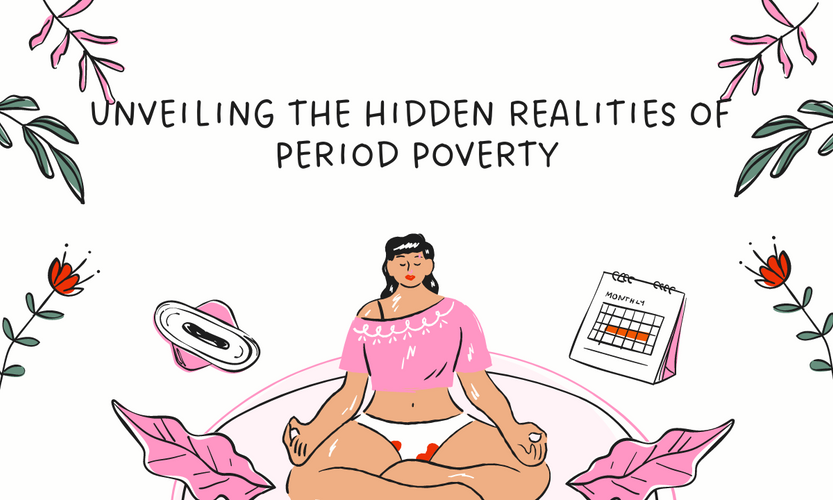Unveiling the Hidden Realities of Period Poverty: A Comprehensive Exploration
Dec 17th 2023

hidden realities of period povery, period poverty, period, realities of period poverty, poverty, ecoyourway, eco your way, eco,
Introduction: Shedding Light on a Silent Struggle
In recent times, the term period poverty has gained prominence, highlighting a critical issue that affects countless individuals around the globe. This article delves into the depths of period-poverty, aiming to provide a comprehensive understanding of the challenges faced by many and shedding light on potential solutions.
Understanding Period Poverty

Defining the Issue
Period-poverty refers to the lack of access to menstrual hygiene products and education, often coupled with social stigma and inadequate sanitation facilities. It is a widespread and deeply rooted problem that transcends geographical boundaries, impacting individuals from various socioeconomic backgrounds.
The Far-reaching Impact
This pervasive issue goes beyond the financial constraints associated with purchasing menstrual products. Period poverty extends its tendrils into education, health, and overall well-being. Many individuals, especially in marginalized communities, face compromised dignity and health due to the unavailability of essential resources.
The Economic Implications of Period-Poverty

A Barrier to Education and Professional Growth
The financial burden of purchasing menstrual products can hinder access to education for young individuals, particularly in developing regions. Girls may miss school days, affecting their academic performance and limiting their potential for personal and professional growth.
The Hidden Workforce Struggle
In workplaces, period-poverty may manifest in various ways. Employees might face challenges in accessing hygiene facilities or might be forced to choose between menstrual products and other necessities. This struggle often goes unnoticed, impacting workplace productivity and the overall well-being of individuals.
Breaking the Stigma: Addressing Societal Taboos
Destigmatizing Menstruation
Societal taboos surrounding menstruation contribute significantly to period poverty. By fostering open conversations and education, we can challenge these stigmas, creating an environment where individuals can seek support without fear of judgment.
Collaborative Solutions for a Global Issue

Government Initiatives
Governments play a pivotal role in addressing period poverty. Implementing policies that ensure affordable access to menstrual products and integrating comprehensive menstrual education into school curricula are essential steps towards a solution.
NGO and Corporate Partnerships
Collaborations between non-governmental organizations (NGOs) and corporations can have a substantial impact. Supporting initiatives that provide free or subsidized menstrual products to those in need, coupled with awareness campaigns, can create a positive ripple effect.
Pros of Addressing Period-Poverty:
- Enhanced Education Access: By addressing period-poverty, individuals, especially young girls, gain improved access to education, breaking the cycle of missed school days and supporting academic achievement.
- Promotion of Gender Equality: Tackling period-poverty contributes to gender equality by addressing a unique challenge faced primarily by individuals who menstruate. It fosters a more inclusive and equitable society.
- Positive Impact on Mental and Physical Health: Adequate access to menstrual hygiene products positively impacts mental and physical health, reducing the risk of infections and promoting overall well-being.
- Increased Workforce Productivity: Addressing period-poverty in workplaces enhances workforce productivity by creating a more supportive and accommodating environment for individuals who menstruate.
- Empowerment Through Awareness: Initiatives aimed at addressing period poverty often include educational components, empowering individuals to understand and take charge of their menstrual health.
Cons of Neglecting Period Poverty:
- Educational Disparities: Neglecting period-poverty exacerbates educational disparities, as individuals facing challenges in accessing menstrual products may continue to miss school days, hindering their academic progress.
- Reinforcement of Gender Inequality: Failure to address period-poverty perpetuates gender inequality, as it disproportionately affects individuals who menstruate, reinforcing societal imbalances.
- Public Health Concerns: The lack of access to menstrual hygiene products can lead to public health concerns, including an increased risk of infections and other menstrual-related health issues.
- Workplace Challenges: Neglecting period-poverty in workplaces can result in decreased employee well-being and productivity, contributing to a less supportive and inclusive work environment.
- Continuation of Stigmas: Inadequate attention to period-poverty allows societal stigmas surrounding menstruation to persist, hindering progress in breaking taboos and fostering open conversations.
Conclusion: A Call to Action

In conclusion, period-poverty is a multifaceted issue that demands immediate attention and collective action. By understanding the far-reaching consequences of this problem and working collaboratively towards solutions, we can create a world where menstrual hygiene is a right, not a privilege.
FAQ's
1. What is period poverty, and how is it defined?
- Period poverty refers to the lack of access to menstrual hygiene products and education, often accompanied by social stigma and inadequate sanitation facilities. It is a widespread issue impacting individuals globally.
2. Who is most affected by period poverty?
- Period-poverty affects individuals across various socioeconomic backgrounds, with a significant impact on marginalized communities. Women and girls in developing regions are often disproportionately affected-
3. How does period-poverty impact education?
- Period-poverty can hinder access to education by imposing financial barriers to purchasing menstrual products. This, in turn, may lead to missed school days, affecting academic performance and opportunities for growth.
4. What are the economic implications of period-poverty in the workplace?
- In workplaces, period-poverty can manifest as challenges in accessing hygiene facilities and a choice between menstrual products and other necessities. This can impact productivity and the overall well-being of employees.
5. How can governments address period-poverty?
- Governments can play a crucial role by implementing policies that ensure affordable access to menstrual products and integrating comprehensive menstrual education into school curriculums.
6. What role do NGOs and corporations play in addressing period-poverty?
- NGOs and corporations can collaborate to make a substantial impact by supporting initiatives that provide free or subsidized menstrual products, along with awareness campaigns to combat stigma.
7. How can we destigmatize menstruation and break societal taboos?
- Destigmatizing menstruation involves fostering open conversations, education, and awareness campaigns to challenge societal taboos surrounding periods.
8. Why is period-poverty considered a global issue?
- Period-poverty transcends geographical boundaries, affecting individuals worldwide. The lack of access to menstrual hygiene products and education is a shared challenge with far-reaching consequences.
9. What are the health implications of inadequate menstrual hygiene?
- Inadequate menstrual hygiene can lead to various health issues, including infections and other menstrual-related health concerns. Access to proper hygiene products is essential for maintaining good health.
10. How can individuals contribute to addressing period-poverty?
- Individuals can contribute by supporting initiatives, spreading awareness, and participating in advocacy efforts. Donating to organizations addressing period-poverty and engaging in open conversations can make a positive impact.

